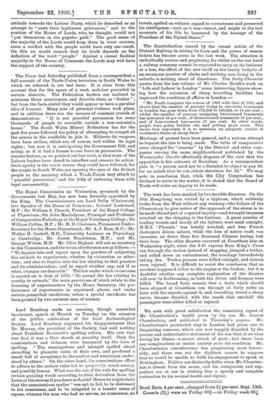The dissatisfaction caused by the recent action of the
District Railway in raising its fares and the prices of season tickets has become acute in the last week. The situation is undoubtedly serious and perplexing, for whilst on the one hand a railway company cannot be expected to carry on its business at a loss, the effect of the new tariff on the family budgets of an enormous number of clerks and working men living in the suburbs is nothing short of disastrous. The Daily Chronicle quotes from the last volume of Mr. Charles Booth's work on "Life and Labour in London" some interesting figures show- ing how the extension of cheap travelling facilities has improved the condition of affairs in London :—
"Mr. Booth compares the census of 1891 with that of 1001, and shows that the number of persons living in one-room tenements in London has gone down from 172,502 to 145,524, or 14 per cent. ; whilst the number of persons occupying two-roomed tenements has increased 16 per cent., of three-roomed tenements 18 per cent., and of four-roomed tenements 21 per cent. In other words, people were going further out, and getting more room. This shows how important it is to maintain an adequate service of workmen's trains at cheap fares."
Meetings of protest have been general, and a serious attempt to boycott the line is being made. The table of comparative rates charged for " seasons " by the District and other com- panies serving the same neighbourhood published by the Westminster Gazette effectually disposes of the view that the opposition is the outcome of Socialism. As a correspondent puts it, "a person need not be a Socialist to object to pay 3d. for an article that he can obtain elsewhere for 2d." We may note in conclusion that, while the City Corporation has declined to move in the matter, it is stated that the Board of Trade will order an inquiry to be made.






































 Previous page
Previous page